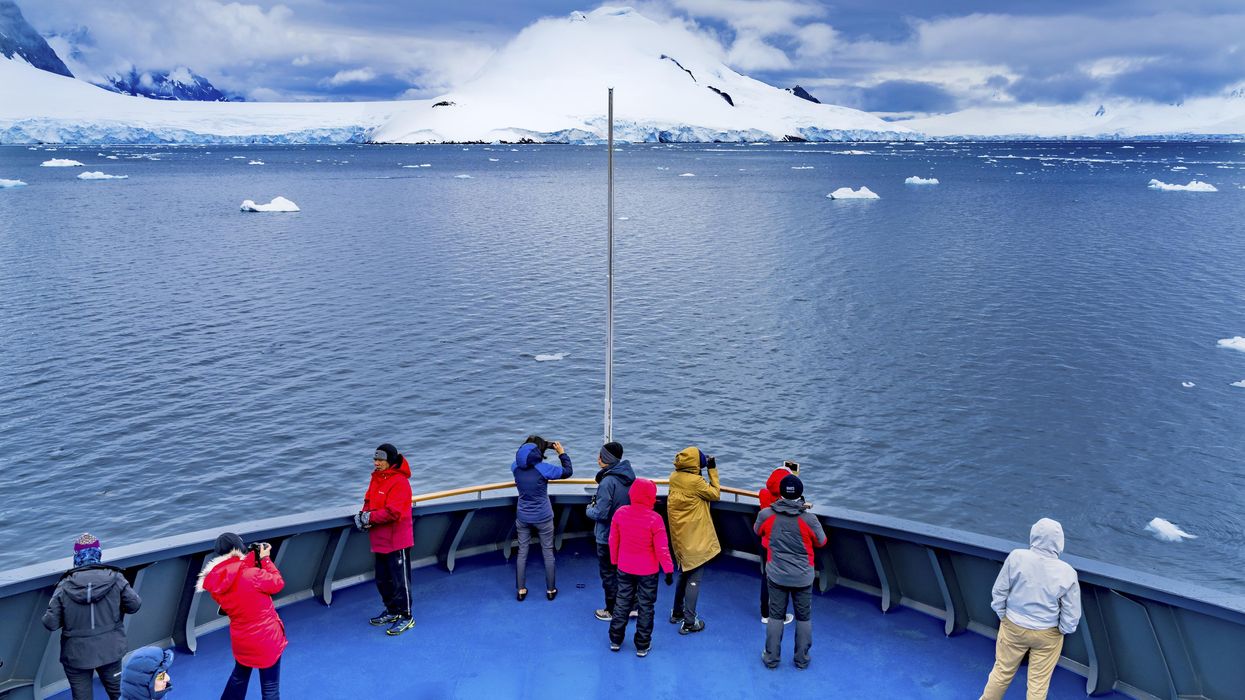The Arctic & Antarctica Just Had Twin Heat Waves That Scientists Say Are 'Not A Good Sign'
This is not fine 🥵

Tourists taking photos on a boat in Antarctica.
The Arctic and Antarctica were dealing with a pair of unexpected heat waves last week, and scientists are alarmed that this kind of thing could snowball — especially because they don't know really why it's happening.
Temperatures at both poles were significantly higher than they should be at this time of year, according to data reported from last week.
Temperatures recorded in Antarctica last Friday were up almost 40 degrees Celsius (70 degrees Fahrenheit), according to reports. The mercury hit a record-high -11.8 Celsius at Concordia Station, which is a lot more tolerable than it should be this time of year.
Meanwhile, it was reportedly warm enough for rain to fall in parts of the Arctic last week, where temperatures were more than 30 Celsius/50 Fahrenheit higher than they're expected to be in mid-March.
Robert Rohde, a lead scientist for a non-profit environmental data group Berkeley Earth, tweeted about the Antarctic spike and he sounded pretty alarmed by what he saw.
"This event is rewriting record books and our expectations about what is possible in Antarctica. Is this simply a freakishly improbable event, or is it a sign of more to come? Right now, no one knows," he said.
Heat wave in Antarctica, +38 \u00b0C (+68 \u00b0F) above normal.\n\nThat's not an error, or a typo.\n\nThe remote research station at Dome C recorded a temperature nearly 40 \u00b0C above normal for this time of year, beating the previous March record by a startling 20 \u00b0C.pic.twitter.com/HkzydQyQ7A— Dr. Robert Rohde (@Dr. Robert Rohde) 1647861706
There is some confusion as to why the poles are experiencing such a huge spike in temperature, but one thing is for certain: it doesn't look good.
“Not a good sign when you see that sort of thing happen,” University of Wisconsin meteorologist Matthew Lazzara told the Associated Press.
Scientists have not been able to link this heatwave to climate change at this point, but they also haven't ruled it out completely. Instead, they're waiting to see more data before they can say what's up.
However, they are pretty concerned about melting sea ice, which broke records when it came to how much it shrank down.
According to the NASA Earth Observatory, sea ice is exactly what it sounds like. It's frozen seawater that forms in both poles each winter. Although you don't have to be concerned about ocean levels rising if the ice melts. Instead, you should be concerned about losing those big white patches on the globe, which reflect a lot of the sun's heat back into space and help keep our planet cool.
Ice reflects more sunlight than the ocean does; however, as the ice melts, more sunlight goes into the ocean. This causes the oceans to heat up and more ice to melt, which can influence climate change, according to NASA.
The temperatures in the Arctic and Antarctica are back down this week, but scientists will be watching to see if it happens again.